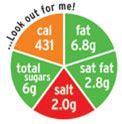
Despite pressure from consumer groups including the European consumers' associtation Beuc, members of the European Parliament have voted overwhelmingly against plans to introduce a compulsory system of colour-coded, 'traffic light' labelling on food packs.
However, the voting session did approve a proposal which would see obligatory country of origin labelling – already in place for fresh fruit and vegetables – extended to all types of meat, fish, poultry, dairy items and other single-ingredient products.
The proposals will now be voted on by the European Council.
Instead of the traffic light system, which provides consumers with a visual indication of the level of fats, sugars, salts and other nturients contained in food products based on a good-to-bad green-yellow-red grading, a rival scheme known as Guideline Daily Amounts (GDA) will instead be introduced on a mandatory basis.
The GDA system, favoured by the food industry and backed by a multimillion-euro lobbying campaign, expresses nutritional content as a percentage of recommended daily intake.
But independent research suggests consumers regard the traffic light system – already being trialled in the UK – as the most straight-forward and reliable source of information when they are trying to buy healthier products.
The scheme is endorsed by the British Heart Foundation, British consumer magazine Which? and the British Medical Association, and is already used by major supermarkets including Sainsbury's.
Monique Goyens, director general of Beuc, told The Guardian: 'Despite being presented with a wealth of independent research confirming that the vast majority of consumers wanted the colour coding system, MEPs have mystifyingly voted against it.
'One wonders how we are to convince lawmakers that the fight against obesity and the battle to improve public health needs to start with action today, not tomorrow. There is no doubt that this vote is a very, very serious setback.'
But Barbara Gallani, director of food safety and science at the UK Food and Drink Federation, said the group welcomed the result of the vote, arguing that it would avoid popular foods including cheese and cereals becoming 'demonised'.
'We are pleased to see that MEPs have taken a measured approach to many aspects of this complex and far-reaching regulation, which will impact all manufacturers – from the largest supermarket supplier to the small producers selling at farmers' markets,' she said.






No comments yet